In this article:
White spots refer to discoloration on the skin due to decreased melanin content. This may occur due to various reasons, such as fungal infections and autoimmune disorders.
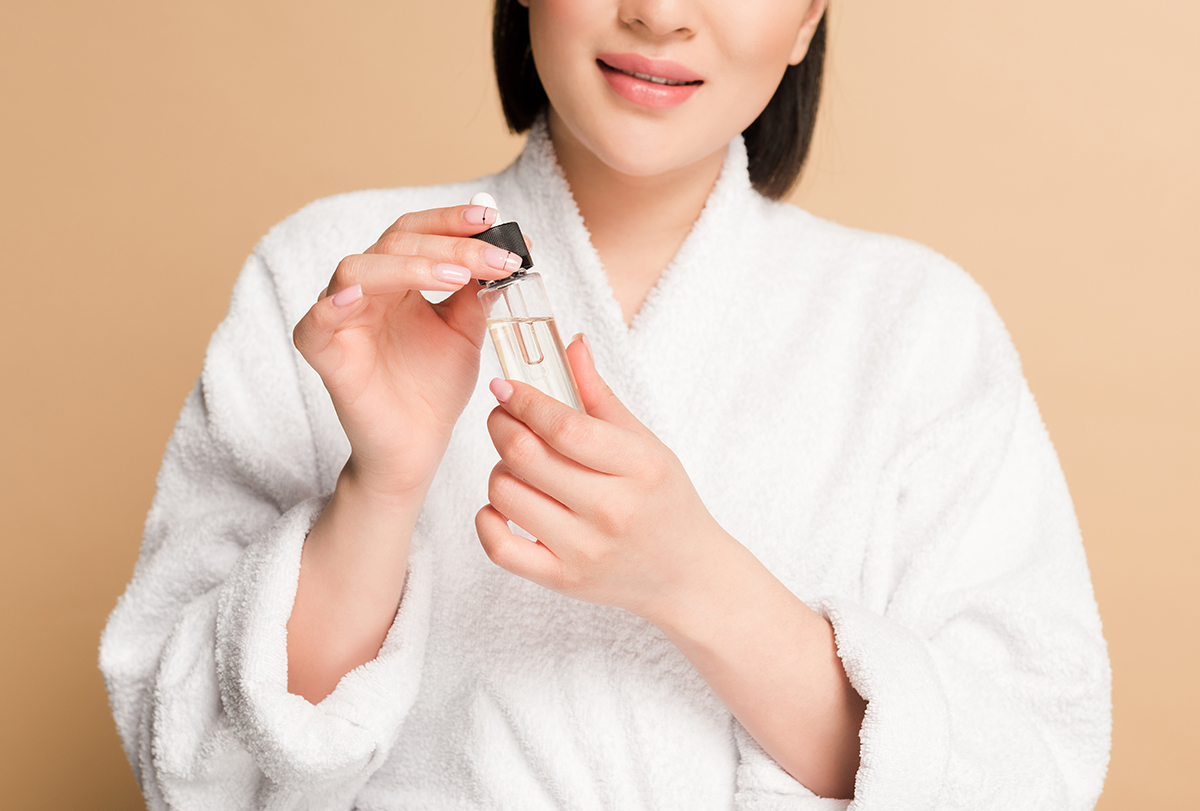
White spots may resolve on their own, but some cases might need treatment to prevent complications. Regardless, the appearance of white spots on the face may be bothersome to people.
This article discusses various home remedies and self-care measures to help manage and prevent white spots.
Home Remedies for White Spots
The following home remedies can help reduce the appearance of white spots on your face and other body parts, depending on the cause. However, in some cases, such as white spots caused by autoimmune disorders, it is vital to consult a doctor for medical treatment.
Disclaimer: Since your facial skin is extremely thin and delicate, it can get easily irritated by any new topical ingredient. So, to avoid any adverse skin reactions such as burns and rashes, perform a patch test of the ingredients on the underside of your arm. If irritation occurs, avoid its use.
Needless to say, people who are allergic to any of the ingredients in the remedy should not use it. Those with sensitive skin are advised to take special precautions before trying out any topical remedy.
1. Apply coconut oil
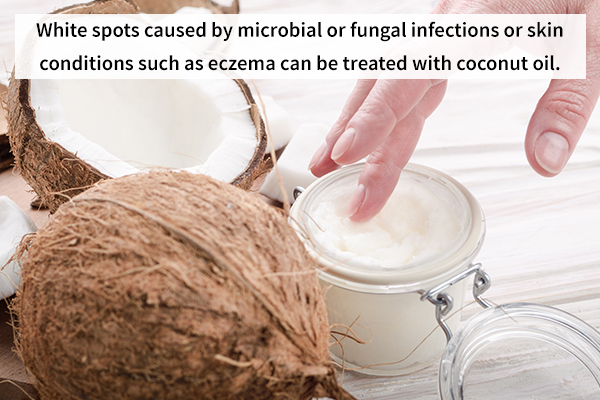
White spots caused by microbial or fungal infections or skin conditions such as eczema can be treated with coconut oil. Coconut oil is known to be efficacious in the management of psoriasis and eczema, of which white spots are a common symptom. (1)
How to use:
Dab some coconut oil on the affected areas using a cotton ball.
2. Use essential oils to treat infections
Tea tree oil possesses microbial and antifungal properties (2) that can help treat infectious cases of white spots. Other essential oils that contain antimicrobial properties include cinnamon, clove, eucalyptus, mint, and thyme oil. (3)
How to use:
Mix 2–3 drops of tea tree oil or any other essential oil in a carrier oil such as coconut or olive oil, and apply the oil blend to the affected area.
3. Try bakuchi oil
Bakuchi oil is made from dried fruits of the babchi plant and sesame oil. The application of this oil can help promote melanin synthesis due to its psoralen content. (4)
How to use:
Dilute 4–5 drops of bakuchi oil with 8–10 drops of coconut oil, and apply this oil blend to the affected areas.
4. Try black cumin oil and fish oil
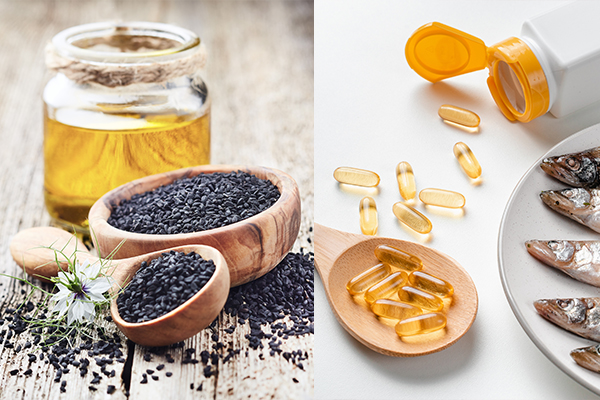
Black cumin oil contains thymoquinone, which can help in the treatment of white spots. This compound is thought to help stimulate melanin release by signaling a neurotransmitter and hence initiating repigmentation. (5)
You can also use fish oil to help reduce the lesion size. However, it is not as effective as black cumin oil. (6)
5. Apply topical piperine
Piperine, extracted from black pepper, can help improve melanocyte proliferation. It has fewer side effects than synthetic drugs such as corticosteroids. Topical piperine is observed to be effective in the treatment of vitiligo when used along with narrow-band UVB (NB-UVB) therapy. (7)
How to use:
Use commercially available piperine oil or piperine cream.
6. Drink copper water
Copper is a vital micronutrient involved in the production of melanin. (8) Therefore, including copper-rich foods such as seeds, nuts, shellfish, whole-grain foods, wheat bran cereals, organ meats, and chocolates can help. You can also use copper water for the same.
How to use:
- Pour water into a copper vessel and leave it overnight. Consume the copper water on an empty stomach. Refrain from putting it in the fridge.
- You can also take copper supplements if you have a copper deficiency upon consulting your doctor.
7. Use topical or oral curcumin
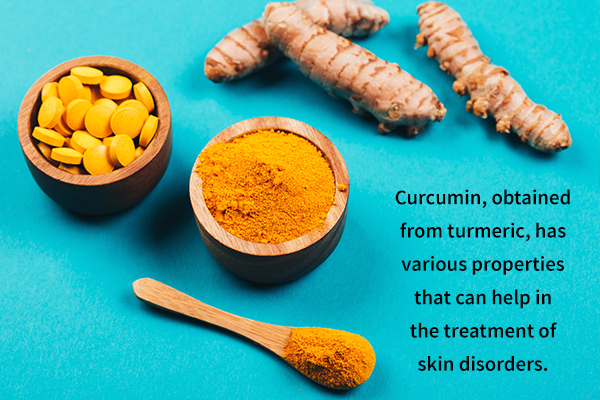
Curcumin, obtained from turmeric, has various properties that can help in the treatment of skin disorders.
One study showed that the topical use of turmeric-containing creams such as tetrahydrocurcumide or even the oral consumption of turmeric can help treat white spots. (9)
How to use:
Mix turmeric and coconut oil, and apply the oil blend to the affected areas. Consult your doctor on the use of curcumin supplements.
8. Use red clay paste
Red clay has a high copper content that can help manage white patches on the face. (10)
How to use:
Mix 1 tbsp of red clay with 1 tbsp of ginger juice. Apply the paste to the affected areas and allow it to dry. Wash your face, pat it dry, and apply a moisturizer.
9. Try OTC creams
You can also use hydrocortisone creams available over the counter. Retinoid or tretinoin creams can also help. These creams are useful in treating white spots caused by sunspots, psoriasis, eczema, vitiligo, and pityriasis alba.
Self-Care Measures for White Spots
The following self-care measures can help manage the appearance of white spots on the skin:
1. Use sunscreen
Wear broad-spectrum sunscreen with SPF 30+, 15 minutes before going outdoors, as white spots can develop due to UV exposure. Reapply the cream every 2 hours.
2. Avoid exposure to UV rays
Shield your skin from the sun rays with full-length clothing. Additionally, use sunglasses and wide-brimmed hats. Do not go out between 10 am and 3 pm, and refrain from using solar lamps and tanning beds.
Note: Since sunlight is essential for vitamin D levels in the body, avoiding complete sun exposure due to certain skin conditions can cause a deficiency. In such a case, it is recommended to consume vitamin D-rich foods, such as meat, eggs, fish, fortified cereals, and margarine. Take supplements only upon the recommendation of your doctor.
3. Consume a proper and well-balanced diet

White spots can develop due to deficiencies in vitamin B12, vitamin E, vitamin D, (11) zinc, (12) calcium, iron, and copper. (13)
Therefore, it is vital to consume foods rich in these nutrients, such as milk, dairy products, and eggs for vitamin D; green leafy vegetables, nuts, seeds, and vegetable oils for vitamin E, peas; and iron-fortified cereals, seafood, beans, and poultry for iron.
You can also take supplements upon consulting your doctor.
4. Use herbal supplements
Some herbal supplements are seen to help in the management of white spots, including ginkgo biloba (14) and picrorhiza. (9)(15) Always consult your doctor before using any supplement.
5. Consume green tea
The polyphenols in green tea can help reduce vitiligo symptoms and also help in its prevention. (9)(16)
6. Avoid hydroquinone-containing foods
Some people with vitiligo may experience worsening of their symptoms upon consuming coffee, white cereals, red wine, and broccoli, as these are rich in hydroquinone, which contributes to depigmentation.
7. Consume plenty of water
Drink at least eight 8-ounce glasses of water every day to keep your skin hydrated.
8. Moisturize your skin
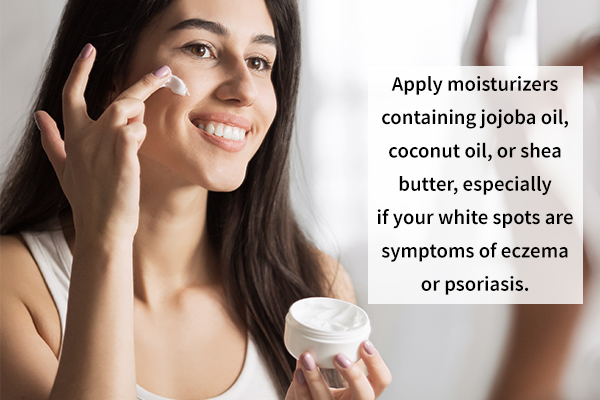
Apply moisturizers containing jojoba oil, coconut oil, or shea butter, especially if your white spots are symptoms of eczema or psoriasis. You can also use unscented emollients to help prevent dry skin.
9. Maintain skin hygiene
Cleanse your skin properly, especially during humid seasons to help avoid fungal infections.
10. Use makeup
Camouflage products such as concealers and creams can help hide the white spots. Make sure to buy noncomedogenic and hypoallergenic products.
11. Exfoliate your skin
Use a mild exfoliator once a week to clear dead skin cells and give your skin an even tone.
12. Manage your stress

Stress has been associated with exacerbation of white spots in some cases. (17) Therefore, stress management techniques, such as daily exercise, yoga, and meditation, may help. You can also try aromatherapy by adding essential oils to your bathwater.
13. Take an Epsom salt bath
Mix half a cup of Epsom salt in a gallon of water, and soak your body in it. This helps de-stress and manage the itching as well.
14. Avoid getting tattoos
In some cases, getting a tattoo can wound your skin, leading to the development of vitiligo around 2 weeks later.
15. Wear breathable clothes
Use light fabrics such as cotton that allow air to pass, thus preventing moisture accumulation in the skin.
16. Avoid smoking and alcohol intake
Smoking and alcohol consumption can contribute to skin problems and therefore, should be avoided.
Final Word
The appearance of white spots on the skin can be concerning, but they are rarely indicative of any serious medical problem.
If you are bothered by your white spots, you can try various home remedies to help manage the condition. It is also suggested to take self-care measures such as wearing sunscreen and consuming a balanced diet to prevent their aggravation.
However, note that white spots may not be completely cured. Consult a doctor if the white spots are large or spreading, as they may indicate an underlying medical condition that requires proper treatment.

- Was this article helpful?
- YES, THANKS!NOT REALLY


